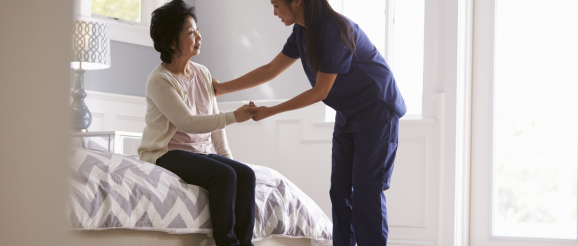Amedisys Expands Into Hospital-at-Home Market With Contessa Purchase | Healthcare Innovation

Amedisys Inc., a home health, hospice and personal care company, is acquiring Contessa Health, a hospital-at-home and skilled nursing facility (SNF)-at-home services company, for $250 million. Amedisys says this move positions it as the first national home health provider to move into the hospital-at-home and SNF-at-home space in a meaningful way with the ability to scale across a large geographic footprint.
Amedisys (NASDAQ: AMED) is among the largest U.S. providers of home health and hospice care, with 408 care centers in 34 states. More than 2,200 hospitals and 61,900 physicians nationwide partner with the company on post-acute care.
The company said it plans to invest in the future growth of Contessa’s business and proprietary informatics platform, CareConvergence. Nashville-based Contessa will operate as a wholly owned division of Baton Rouge, La.-based Amedisys.
Founded in 2015, Contessa partners with health systems and health plans to offer complex patients acute and post-acute care in their homes. Contessa said its risk-based model and claims analytics capabilities bring the essential elements of inpatient hospital and SNF care to patients’ homes. It has payer partnerships and joint ventures with several health systems such as Mount Sinai Health System, Marshfield Clinic Health System, Ascension Saint Thomas, CommonSpirit Health, and Highmark Health.
“While Amedisys continues to be a national leader in quality home health and hospice services, we have always worked to innovate and provide even more types of care in the home, as patients increasingly seek to ‘age in place’ in environments that are familiar and safe. Bringing the Contessa team into our family significantly advances this strategy,” said Amedisys Chairman and CEO Paul Kusserow in a statement.
Contessa CEO Travis Messina and his management team will continue to lead Contessa, which will maintain its brand and operate and be reported on as a separate business within Amedisys.
In a 2020 interview with Healthcare Innovation, Messina described some of the company’s experiences during the pandemic.
Contessa has been working on the hospital at home model with Mount Sinai Health System in New York for several years. “New York was experiencing a massive surge, with hospitals at full capacity and running out of PPE,” he said. “We were able to get some of the patients out of the hospital and yet provide hospital-equivalent services to free up capacity.” He noted that within 10 days of Mount Sinai’s initial outreach about the COVID emergency, Contessa was moving Mount Sinai patients out of the hospital and into their homes. These patients saw their risk of infection decrease, while comfort and satisfaction increased, he adds. Clinicians also identified patients with COVID symptoms they were comfortable treating in the home, so Contessa began accepting patients who tested positive for the virus into the Mount Sinai at Home program. The biggest challenge was making sure there was enough PPE available, he said.
When the virus started proliferating across the country, Messina said, a number of health systems called the company because they needed something to help with the surge and create as many beds as possible — physical or virtual. “One cohort of health systems is only thinking about the near-term problem, but another group contacted us because they had an epiphany of sorts and realized they needed to think about this for the long-term,” Messina said. “I applaud them, because while they had a team doing disaster planning, they also had another team planning for the future and being methodical in terms of how they build this out to be a critical component of their delivery system.”
Last year Angela Orsky, R.N., vice president for post-acute services at South Carolina-based Prisma Health, told Healthcare Innovation that Prisma had been working for a year on setting up a joint venture with Contessa Health to offer acute-care services to patients in the home using both on-site and hospital-based nurses, telehealth and remote monitoring overseen by a Prisma hospitalist.
“When South Carolina started seeing a surge in COVID cases, we began brainstorming with Contessa about our options for patients to receive care in their homes. Our work with payers allows us to offer a solution where once patients are stabilized in the hospital after a day or two of hospitalization, we could transition them home to complete their acute care services — and it could be a COVID or non-COVID patient,” she explained.
Prisma contracts with Contessa for a team of nurses called recovery care coordinators who are embedded in the hospital and are very familiar with the model of care and the clinical pathways. They do remote monitoring of the patients and communicate with the other care team members.
The issues around hospital capacity and patients’ anxiety about COVID and hospital stays — and the fact that visitors were not allowed in hospitals — all reinforced the use of a solution that redesigned how Prisma delivers care, Orsky said. “We already had this relationship with Contessa and we already had infrastructure in place. The timing was perfect to implement a program like this and do it rapidly,” she added. “Our patients have fallen in love with this opportunity to be back at home and are seeing the benefits of recovery in their own home setting. When we looked at what was happening around us in South Carolina, it just made perfect sense for us to be able to pivot and offer a different solution.”
